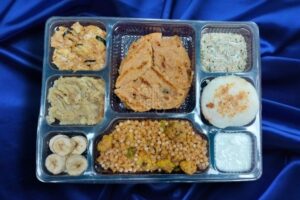
It’s time for the monsoon season, and what better way to kick off the festive season!! It’s no winter season, but the number of festivals in India in monsoons are aplenty. The main event to start is the Shravana Maas, which encompasses other famous festivals of the Indian culture.
The Hindu calendar, unlike the Gregorian calendar, works differently, where Shravana is the fifth month. Shravana is the holy month that signifies the arrival of the South-West monsoon. Also known as Sawan ka Mahina, this month derives its name from the one that rules the skies during Purnima (full moon day), Shravana Nakshatra. Hence, the Shravana month is auspicious for Indians and consists of popular festivities. Moreover, every year, the Shravana month begins sometime around late July and ends mid-August, according to the Gregorian calendar. People mark the start and the end of this month by full moons (Purnima), and they spend the entire month fasting. According to rituals, people dedicate a Monday fast to Lord Vishnu and every Tuesday to Goddess Parvati. Fasting every Tuesday of this month is locally known as ‘Mangala Gauri Vrat‘.
 According to folklore, the Shravana month has a rich history making it auspicious. The ‘Puranas‘ and the ‘Samudra Manthan‘ were extracting ‘Amrit‘. During the process, a deadly poison started to emerge. The Devas and Asuras couldn’t touch it, and it would have meant the end of the universe. However, Lord Shiva drank the poison and stored it in his throat and hence, he received the title ‘Neelkantha‘. Furthermore, to reduce the effects of the poison, the Devas would offer holy water from the Ganges. This story took place during this month, and that’s why it is considered auspicious.
According to folklore, the Shravana month has a rich history making it auspicious. The ‘Puranas‘ and the ‘Samudra Manthan‘ were extracting ‘Amrit‘. During the process, a deadly poison started to emerge. The Devas and Asuras couldn’t touch it, and it would have meant the end of the universe. However, Lord Shiva drank the poison and stored it in his throat and hence, he received the title ‘Neelkantha‘. Furthermore, to reduce the effects of the poison, the Devas would offer holy water from the Ganges. This story took place during this month, and that’s why it is considered auspicious.
People fast on Mondays because it is auspicious, and believe that the worship of Lord Shiva is 108 times more powerful. Several Hindus observe the Shravan Somwar Vrat- fasting and devoting pujas every Monday. Moreover, the month of Shravan is very dear to Lord Shiva, and those who perform Somwar Vrat are blessed with happiness. However, people’s purpose for fasting can vary. Some may do it for long life, a happy married life, or for their loved one’s well-being. Devotees worship Lord Shiva with a concoction consisting of Bael Leaves, water, and milk.
Fasting, for devotees, is an important ritual, and it tends to affect us. It helps in detoxifying our body, and it’s a way to recharge and rejuvenate. Furthermore, we need to make a healthier choice because our digestive system is not strong in these humid conditions. Meanwhile, fasting can take a toll on our body as it tends to make it weak, and we feel low on energy.
 Indians adhere to a strict vegetarian diet. So, during fasting, you can eat fruits, delicacies consisting sabudana (tapioca), milk and milk products, and bhagar (barnyard millets) but cannot include garlic, onions, and table salt in their diet. You can enjoy dishes like Sabudana Khichdi, Upwas Tikki, Upwas Combo, and many other delicacies. These fasting dishes can help you keep you maintain immunity during fasting.
Indians adhere to a strict vegetarian diet. So, during fasting, you can eat fruits, delicacies consisting sabudana (tapioca), milk and milk products, and bhagar (barnyard millets) but cannot include garlic, onions, and table salt in their diet. You can enjoy dishes like Sabudana Khichdi, Upwas Tikki, Upwas Combo, and many other delicacies. These fasting dishes can help you keep you maintain immunity during fasting.
Along with these delicious fasting items, the Shravana month is full of vibrant festivals as well. Some are-
- Krishna Janmashtami celebrates the birth of Lord Krishna on the 8th day after the full moon. Gopalkala, Kheer, Panchamrit, Muruku, are some of the few famous dishes during this festival.
- Raksha Bandhan is a festival that signifies the bond between brothers and sisters. The festival means ‘Bond of Protection‘.
- Onam is a South Indian festival originating in the state of Kerala to honour the Asura (Demon) king, Mahabali.
 Teej, like Shravan, is a month full of festivals celebrated by women in Nepal and North India. Women celebrate Haryali Teej and Hartalika Teej to welcome the monsoon.
Teej, like Shravan, is a month full of festivals celebrated by women in Nepal and North India. Women celebrate Haryali Teej and Hartalika Teej to welcome the monsoon.- Nag Panchami is a Vedic worship of snakes and is celebrated on the fifth day of Shravana.
- Varalakshmi Vratam where ‘vara’ means boon. On this day, the Goddess of Fortune, Lakshmi grants wish fulfillment.
Many other notable festivals are Narali Purnima, Gayatri Jayant, Basava Panchami, Kajari Purnima, Pavitropana, Pavitra Ekadashi, Pola, Shravana Mela, and many others.
So, to all non-vegetarian lovers, we hope that you can power through a month of pure vegetarian delicacies. We hope you all enjoy this Shravana month and enjoy all the delectable food during the various festivals!!
